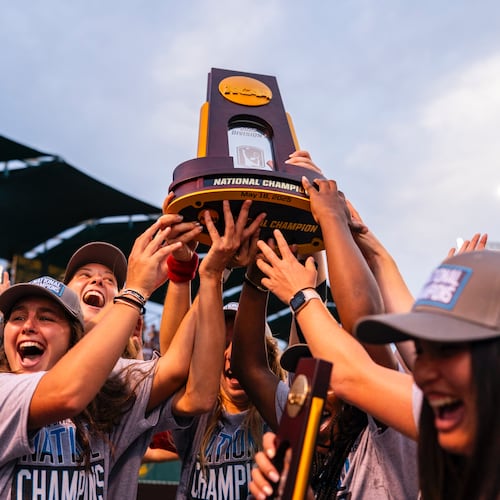A Big Ten official working the 2017 College Football Playoff Championship Game between Georgia and Alabama finally admits what everybody who saw it already knew.
Tyler Simmons was indeed not offside.
Not that it will change anything now, and there’s no way to know if it would have changed anything then. But the referees who officiated the game admit to botching a potentially momentous play that could have further tilted the outcome the Bulldogs’ way.
In a wide-ranging interview with the Chicago Tribune on the occasion of his retirement from college football officiating, longtime, respected Big Ten referee Dan Capron included Georgia's blocked punt against Alabama on his list of controversial calls that solicited outrage from a fan base.
» MORE: Conspiracies in Alabama's win over Georgia
Capron told Tribune reporter Teddy Greenstein the reaction from UGA fans was as vicious and vile as anything he has ever experienced.
“You know, you were talking about the Michigan fan base; well, they’re pikers compared to the Georgia fan base,” said Capron, 63, who has a full-time job as a partner in a Chicago law firm. “I was getting emails, texts. It was ugly, vile. Something gets out on the internet that I somehow worked for the University of Alabama, and it becomes gospel truth. Of course, I couldn’t care less (who wins).”
But Capron understands the Bulldog Nation’s frustration. They definitely got the call wrong, he admitted. But, as has been well-documented since then, it still wouldn’t have turned out the way Georgia wanted had they gotten it right.
The correct call would have been false start on Alabama, blocked punt nullified, five-yard penalty, re-kick.
In real time, though, it looked as if Simmons, who’d timed a running rush from the left side of the defense perfectly, had gotten a clean punt-block and that the Bulldogs – already leading 13-0 with massive momentum early in the third quarter — would take over deep in Alabama territory.
As it was, Simmons was called offside, Alabama moved up five yards and punted the ball 54 yards. Mecole Hardman actually returned it 19 yards to the 36. But the Bulldogs went three-and-out from there.
Capron doesn’t discuss the missed facemask call when D’Andre Swift was yanked down for an 8-yard loss on the ensuing three-and-out possession. But he admits the mistake on the blocked punt.
“We had a miss,” said Capron, who was the white-capped, lead official in the game. “Alabama was on the ropes. They were deep in their own territory and they’re punting. The punt gets blocked. There’s a flag on the ground because the line judge had Georgia offside. Oh, boy. He (Simmons) actually had a running start and timed it (properly). He wasn’t offside.
“But that wasn’t my call. The blocking backs, a split-second before the snap, moved. That was a false start. That should have been my call. It still wouldn’t have been a blocked punt, but instead a 5-yard penalty against the offense. You never want to make a mistake of any kind in such a high-profile atmosphere.”
Alabama would, of course, go on to win 26-23 in overtime.
For what it’s worth, The Atlanta Journal-Constitution reached out to the Big Ten officials for comment in the days and weeks after the game. No response was ever provided.
Capron seemed gracious and apologetic about mistakes he and/or his crews have made over the years. He talked about it being an extremely difficult but rewarding vocation. He discussed how the college-game atmosphere is so much better than the NFL, even though much less rewarding financially.
Capron said college referees make about $50,000 a year, while pro refs earn about $200,000. But Capron, who called Big Ten games for 20 years, said most college officials don’t do it for the money. He earned far more than that from his law practice.
Capron said refs do it for the love of the game and with the intention of getting every call right. Unfortunately, he said, that rarely happens.
Case in point Georgia-Bama, Jan. 8, 2018.
About the Author
Keep Reading
The Latest
Featured



